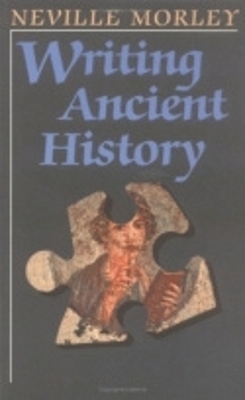
Writing Ancient History
Seiten
1999
Cornell University Press (Verlag)
978-0-8014-8633-3 (ISBN)
Cornell University Press (Verlag)
978-0-8014-8633-3 (ISBN)
How do ancient historians pursue their craft? From the evidence of coins, pottery shards, remains of buildings, works of art, and, above all, literary texts—all of which have survived more or less accidentally from antiquity—they fashion works of...
How do ancient historians pursue their craft? From the evidence of coins, pottery shards, remains of buildings, works of art, and, above all, literary texts—all of which have survived more or less accidentally from antiquity—they fashion works of history. But how exactly do they go about reconstructing and representing the past? How should history be written?
These and related questions are the subject of Neville Morley's engaging introduction to the theory and philosophy of history. Intended for students and teachers not only of ancient history but of historiography, the philosophy of history, and classics, his book addresses the implications of debates over methodological and theoretical issues for the practice of ancient history.
At the present time, Morley says, students of ancient history are left to come to their own understanding of the field through a process of trial and error. In his view, too many professors regard "questions of theory and methodology... as pointless distractions from the business of actually doing history. Worse, [these questions] may even be perceived as a threat to the subject." Asserting that more attention must be given to fundamental matters, Morley considers such topics as the nature of historical narrative, style in historical writing, the use and abuse of sources, and the reasons for studying history.
How do ancient historians pursue their craft? From the evidence of coins, pottery shards, remains of buildings, works of art, and, above all, literary texts—all of which have survived more or less accidentally from antiquity—they fashion works of history. But how exactly do they go about reconstructing and representing the past? How should history be written?
These and related questions are the subject of Neville Morley's engaging introduction to the theory and philosophy of history. Intended for students and teachers not only of ancient history but of historiography, the philosophy of history, and classics, his book addresses the implications of debates over methodological and theoretical issues for the practice of ancient history.
At the present time, Morley says, students of ancient history are left to come to their own understanding of the field through a process of trial and error. In his view, too many professors regard "questions of theory and methodology... as pointless distractions from the business of actually doing history. Worse, [these questions] may even be perceived as a threat to the subject." Asserting that more attention must be given to fundamental matters, Morley considers such topics as the nature of historical narrative, style in historical writing, the use and abuse of sources, and the reasons for studying history.
Neville Morley is Lecturer in Ancient Economic History and Historical Theory at the University of Bristol and the author of Theories, Models, and Concepts in Ancient History and Metropolis and Hinterland: The City of Rome and the Italian Economy, 200 b.c.-a.d. 200.
| Erscheint lt. Verlag | 22.7.1999 |
|---|---|
| Verlagsort | Ithaca |
| Sprache | englisch |
| Maße | 140 x 216 mm |
| Gewicht | 454 g |
| Themenwelt | Geschichte ► Allgemeine Geschichte ► Vor- und Frühgeschichte |
| Geisteswissenschaften ► Geschichte ► Geschichtstheorie / Historik | |
| ISBN-10 | 0-8014-8633-5 / 0801486335 |
| ISBN-13 | 978-0-8014-8633-3 / 9780801486333 |
| Zustand | Neuware |
| Haben Sie eine Frage zum Produkt? |
Mehr entdecken
aus dem Bereich
aus dem Bereich
auf den Spuren der frühen Zivilisationen
Buch | Hardcover (2023)
C.H.Beck (Verlag)
CHF 27,95
Konzepte – Methoden – Theorien
Buch | Softcover (2024)
UTB (Verlag)
CHF 55,85
Was Pompeji über uns erzählt
Buch | Hardcover (2023)
Propyläen (Verlag)
CHF 44,75


